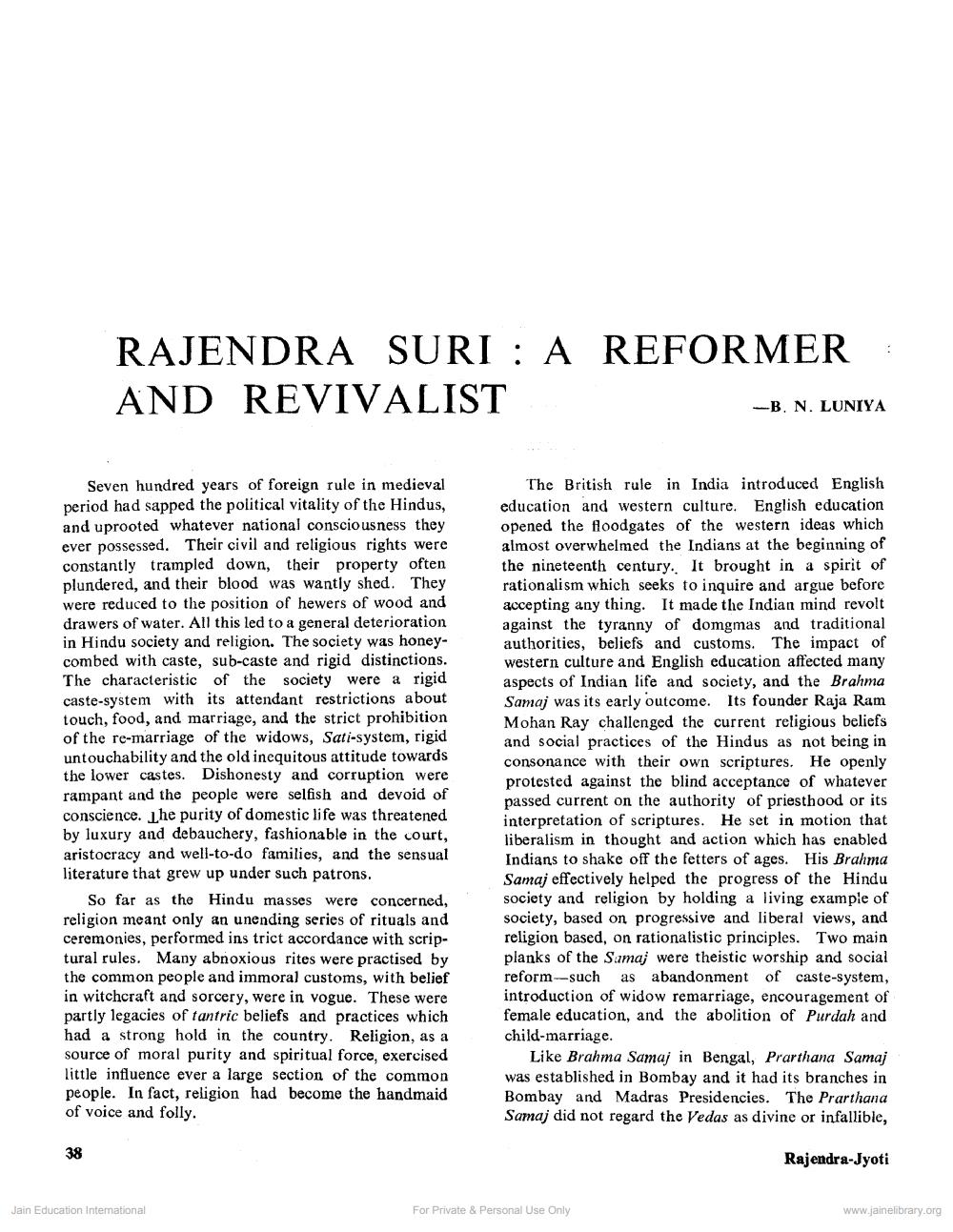Book Title: Rajendrasuri A Reformer and Revivalist Author(s): B N Luniya Publisher: Z_Rajendrasuri_Janma_Sardh_Shatabdi_Granth_012039.pdf View full book textPage 1
________________ RAJENDRA SURI : A REFORMER AND REVIVALIST -B. N. LUNIYA Seven hundred years of foreign rule in medieval period had sapped the political vitality of the Hindus, and uprooted whatever national consciousness they ever possessed. Their civil and religious rights were constantly trampled down, their property often plundered, and their blood was wantly shed. They were reduced to the position of hewers of wood and drawers of water. All this led to a general deterioration in Hindu society and religion. The society was honeycombed with caste, sub-caste and rigid distinctions. The characteristic of the society were a rigid caste-system with its attendant restrictions about touch, food, and marriage, and the strict prohibition of the re-marriage of the widows, Sati-system, rigid untouchability and the old inequitous attitude towards the lower castes. Dishonesty and corruption were rampant and the people were selfish and devoid of conscience. The purity of domestic life was threatened by luxury and debauchery, fashionable in the court, aristocracy and well-to-do families, and the sensual literature that grew up under such patrons. So far as the Hindu masses were concerned, religion meant only an unending series of rituals and ceremonies, performed ins trict accordance with scriptural rules. Many abnoxious rites were practised by the common people and immoral customs, with belief in witchcraft and sorcery, were in vogue. These were partly legacies of tantric beliefs and practices which had a strong hold in the country. Religion, as a source of moral purity and spiritual force, exercised little influence ever a large section of the common people. In fact, religion had become the handmaid of voice and folly. The British rule in India introduced English education and western culture. English education opened the floodgates of the western ideas which almost overwhelmed the Indians at the beginning of the nineteenth century. It brought in a spirit of rationalism which seeks to inquire and argue before accepting any thing. It made the Indian mind revolt against the tyranny of domgmas and traditional authorities, beliefs and customs. The impact of western culture and English education affected many aspects of Indian life and society, and the Brahma Samaj was its early outcome. Its founder Raja Ram Mohan Ray challenged the current religious beliefs and social practices of the Hindus as not being in consonance with their own scriptures. He openly protested against the blind acceptance of whatever passed current on the authority of priesthood or its interpretation of scriptures. He set in motion that liberalism in thought and action which has enabled Indians to shake off the fetters of ages. His Brahma Samaj effectively helped the progress of the Hindu society and religion by holding a living example of society, based on progressive and liberal views, and religion based, on rationalistic principles. Two main planks of the Samaj were theistic worship and social reform--such as abandonment of caste-system, introduction of widow remarriage, encouragement of female education, and the abolition of Purdah and child-marriage. Like Brahma Samaj in Bengal, Prarthana Samaj was established in Bombay and it had its branches in Bombay and Madras Presidencies. The Prarthana Samaj did not regard the Vedas as divine or infallible, 38 Rajendra-Jyoti Jain Education Intemational For Private & Personal Use Only www.jainelibrary.orgPage Navigation
1 2 3
